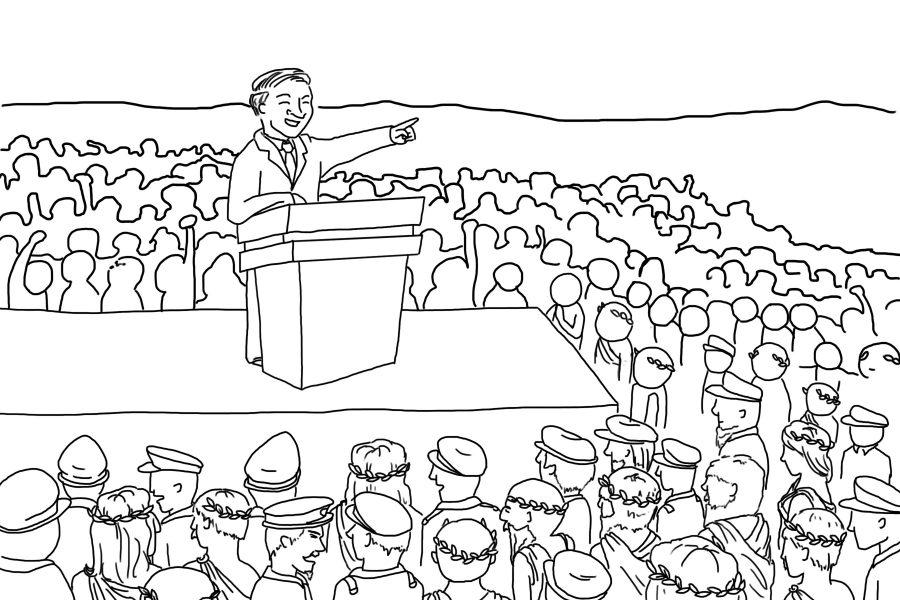We have entered a leadership selection season on steroids. Everywhere one looks, longtime leaders are preparing to move on and open space for successors. One can see this in Washington as well as in Austin, in our politics, our businesses and our universities.
Leadership transitions are the lifeblood of democracy and innovation. Effective representation of a dynamic citizen body requires periodic change in leaders, placing new figures in positions to embody the hopes and needs of new times. Innovation in governance requires fresh ideas and actions that shake up inherited assumptions while remaining true to fundamental sources of stability and achievement. Effective leadership transitions are, therefore, dynamic and challenging, but not revolutionary. A truly transformational leader builds on the past to push in new directions that reflect changes around society and opportunities for the future.
At a world-class university, we are committed to training transformational leaders. That is why we are here. We are also devoted to educating citizens about how to identify and work with important leaders. All leaders are also followers of other leaders. For our society to prosper, we must have a clear understanding of what it means to be a good leader and to be led by a good leader. Our elections should be an extended discussion of these core issues rather than the glib ideological debates that dominate our attention and have little relationship to leadership at all.
The best essay on leadership remains Max Weber’s lecture on “politics as a vocation,” delivered to an audience of German students in 1919, months after the end of the First World War and the spread of revolutionary violence in Europe. Weber argued that leadership involves two parallel forms of thinking: the “ethic of ultimate ends” and the “ethic of responsibility.” Ultimate ends are the hopes, goals and visions that all leaders must have. They are the dreams of a better world that motivate people to try new things, to make sacrifices, to believe in a cause. Responsibility, for Weber, is the attention a leader gives to the various moral and human costs of action, the numerous reactions and the possible alternatives. If ultimate ends motivate an ambitious leader to steam ahead, responsibility inspires second thoughts and efforts to help those who are left behind.
Weber is clear that we cannot have responsibility without ultimate ends or vice versa. A leader must lead somewhere, and he or she cannot allow herself to be debilitated by doubts and regrets about necessary costs. At the same time, the ends do not justify the means — a good leader must interrogate costs for various groups in his or her society and think deeply about how to help everyone, including those who do not benefit from a compelling and popular vision. Leadership has a steadfast purpose and it helps humans along; it does not trample over them because they are weak or different. Everyone in a large society will never agree, but a leader must try to lead everyone, not just his or her favorites and supporters.
Weber closed his essay with some moving words: “Politics is a strong and slow boring of hard boards. It takes both passion and perspective. Certainly all historical experience confirms the truth — that man would not have attained the possible unless time and again he had reached out for the impossible. But to do that a man must be a leader, and not only a leader but a hero as well, in a very sober sense of the word. And even those who are neither leaders nor heroes must arm themselves with that steadfastness of heart which can brave even the crumbling of all hopes.”
As we choose leaders, and make ourselves into new leaders, we should all think long and hard about ultimate ends and responsibility. Our society seems stuck and divided, and we need a vision to motivate ourselves to do better — in our universities, in our cities, in our nation and in the world as a whole. Our society also seems remarkably callous about the deepening inequalities and injustices all around us. We rarely address the costs of our lifestyles and the barriers for those, near and far, who cannot touch what we have.
Our ultimate ends at the University should be big and ambitious, and our actions in pursuit of those ends should be responsible to citizens of various backgrounds and experiences. This is a very difficult agenda, and it requires many compromises, adaptations and sacrifices. Most of all, it requires leadership that will inspire us to be bold and simultaneously hold us accountable to our responsibilities. That is the overall ethic of leadership — what Weber described as a life-long calling. Leadership does not come easily, and it is not a popularity context. It is a disciplined, humbling and ever-evolving effort to make big improvements for a diverse community.
Suri is a professor in the LBJ School of Public Affairs and the Department of History. Follow Suri on Twitter @JeremiSuri.





















